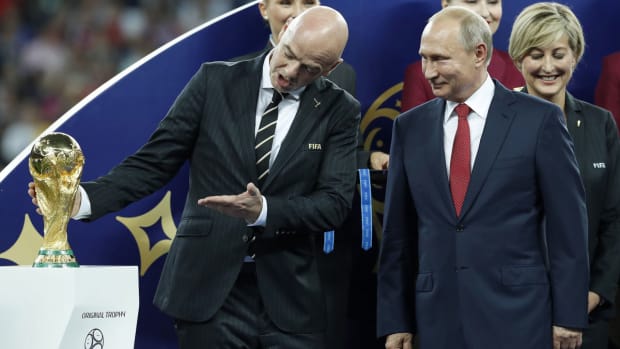So many issues, ranging from practicality to the fragile international calendar and beyond, call FIFA’s aggressive push into question.
There is, officially, a consultation process currently being conducted by FIFA into the feasibility of staging a men’s World Cup every two years. But FIFA’s chief of global development, Arsène Wenger, has been outspoken in favor, while the sport's governing body has wheeled out an array of former stars—Didier Drogba, Jürgen Klinsmann, Marco Materazzi, Lothar Matthäus, Michael Owen, Roberto Carlos, Ronaldo, Peter Schmeichel, John Terry and Yaya Touré among them—to issue similarly worded statements expressing their support. A previous report concluded a biennial World Cup was a bad idea, yet who could possibly predict how this story will end?
Why FIFA is in favor of it is clear: money. About 95% of its income in a four-year cycle comes from World Cups. Doubling the number of tournaments probably won’t quite double its revenues, but it could come close. This is also about power and the ongoing struggle between FIFA and UEFA for control of the game. More meaningful matches should enhance FIFA’s status.
UEFA, seeing a crammed calendar, and worrying both about the strain on players and the possible impact on its own income, is understandably opposed. Its president, Aleksander Čeferin, has already threatened a boycott, which, if it could be enacted, given that it’s been 20 years since the last non-European World Cup winner and 13 of the last 16 semifinalists have been European, would effectively render any FIFA tournament irrelevant. (And that perhaps highlights what a dangerous game FIFA is playing. We’re nowhere near this stage yet, but suppose the major European nations decided to secede and go at it alone. They would only have to entice Brazil and Argentina to join them and then FIFA itself could effectively be rendered irrelevant.)

VI Images/Getty Images
Four of the more vociferous federations in support of the proposal have been Bangladesh, the Maldives, Nepal and Sri Lanka, none of which has ever qualified even for the Asian Cup, let alone a World Cup. FIFA has a responsibility to represent all of its members and all levels of the game, but it’s not unreasonable to ask why those four nations are so keen on a plan that will affect them only indirectly.
But beyond the politics, there is a serious point about the calendar, which was stretched to almost a breaking point even before COVID-19 led the authorities effectively to try to cram three and a half seasons into three years. There does need to be a rationalization and it may be that this wrangle is the beginning of much-needed negotiations over how football looks in the future.
Quite how Wenger’s plan for a World Cup every other year with confederational tournaments fits in with that is unclear (plus the idea of all confederational tournaments being played in the northern European summer is unworkable in a huge number of countries, as the decision to shift the Qatar World Cup to November demonstrates). Players need a break (they're not alone in the grand scheme; journalists certainly need a break, and it may be fans do as well), as a constant treadmill of games cannot be good for them, either physically or mentally.
It’s hard to believe many would not end up withdrawing from the confederational tournaments, thus devaluing them. Which is what makes the framing of the negotiations as Europe vs. the rest of the world so odd. The Confederation of African Football, now essentially a FIFA protectorate, has also backed the proposal (giving FIFA a guaranteed 55 of the 211 votes in its Congress), yet this seems like a dreadful thing for mid-ranking African sides such as Burkina Faso, Guinea or Mali, who have a recent history of success in the Cup of Nations but have never been close to qualifying for a World Cup.

Jewel Samad/AFP/Getty Images
Then there are the practicalities of qualifying. It’s hard enough to fit in the qualifiers as it is. Wenger’s proposal airily makes the point that fans are bored with meaningless games, which is probably true—England 4, Andorra 0 last Sunday was essentially irrelevant—but without qualifiers, how do you decide who plays in major tournaments?
Wenger’s suggestion of fewer, longer blocks of qualifiers seems sensible and less disruptive to the club season, and allows international managers greater continuity, but he still acknowledges the need for them. Perhaps there is some way of streamlining them via something like the Nations League, but there are dangers even in that conversation. Few doubt, for instance, that South American qualifying, whereby every side plays everybody home and away, has raised the level of Chile, Paraguay, Ecuador, Venezuela and Bolivia.
And what happens to FIFA’s plans for an expanded Club World Cup? It’s notable that that was backed by Saudi money and that it was the Saudi federation who made the first call for the biennial World Cup. Have those plans just been shelved? Or does FIFA believe that tournament can somehow also be squeezed in, perhaps in those years of confederational tournaments?
The whole thing is a mess. There is a serious need for serious discussion about the calendar and reducing the workload on players, but nobody involved can be trusted to act in good faith. This is all about politicking and money, with little thought for players, for fans or the game itself. Football’s administrators seem determined to kill the golden goose.
More Soccer Coverage: